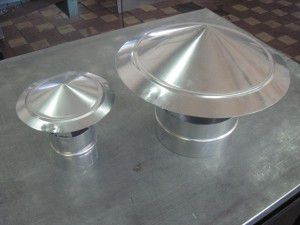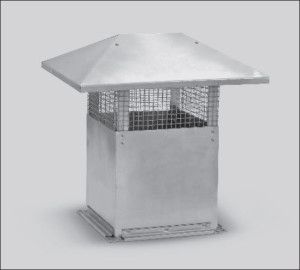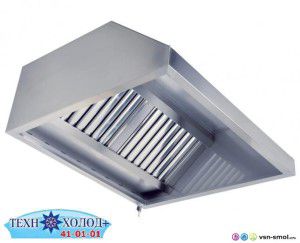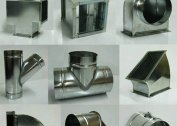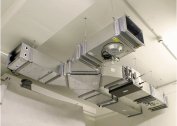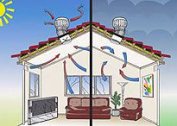The main purpose of the umbrella for exhaust ventilation is to protect vertical ventilation ducts from rain, snow, foliage. Even such a small detail of exhaust ventilation as an umbrella must comply with technical standards. An improper ventilation umbrella can cause traction to deteriorate, rain or to become clogged in the system.
The size and type of umbrella is selected depending on the parameters of the ventilation duct neck. Protective devices are produced in accordance with TU and GOST, their sizes and characteristics are determined by SNiPs.
Types of ventilation umbrellas
Depending on the form and purpose, exhaust ventilation umbrellas are:
- round;
- rectangular;
- exhaust;
- sewer.
Round ventilation umbrellas
Round umbrellas are installed on the ends of the ventilation pipes of the corresponding section. They are suitable for systems with any type of traction, protecting the pipes from precipitation. Umbrellas are fastened with a bandage, flange or nipple connection.
They make round umbrellas for ventilation systems from:
- galvanized steel sheet;
- copper;
- PVC
- of stainless steel.
Plastic is used mainly for the production of ventilation sewer umbrellas.
Some models are complemented by a grid that covers the outlet from small rodents, birds, and dry foliage.
Rectangular Ventilation Umbrellas
Rectangular and square ventilation umbrellas are usually installed on insulated exhaust shafts. Fasten with a nipple connection.
Rectangular umbrellas for ventilation are produced from sheet steel with a thickness of 0.55 - 1 mm according to TU. The aspect ratio can be selected depending on the design of the mine, but subject to GOST for umbrellas of ventilation systems. The outlet of the rectangular ventilation hood can also be covered with a net.
Sewer ventilation umbrellas
PVC umbrellas for ventilation of the internal sewerage have the same protective function, but they also regulate the pressure in the pipes. A ventilation umbrella is installed on the head of a pressureless sewer pipe, it can withstand up to +60 degrees. For fastening PVC ventilation umbrellas, a bell-shaped connection is used, which is sealed with a rubber ring that prevents leakage.
GOST requirements for PVC umbrellas of ventilation systems:
| Diameter in mm | Mass, gr |
| 50 | 890 |
| 110 | 1230 |
The diameters of the PVC ventilation umbrellas coincides with the standard size range of sewer pipes and can be 50 or 110 mm. PVC ventilation umbrellas are made only for circular cross-section.
Exhaust ventilation hoods
Hood umbrellas are installed in the kitchens of cafes and restaurants above hobs and ovens. Hot air and steam rise up and immediately fall into the hood of the exhaust hood. To enhance efficiency, a fan is often integrated into the umbrella. There are also supply and exhaust models of kitchen umbrellas.
Exhaust ventilation umbrellas can be:
- By the wall. They are hung on a wall above a source of heat and moisture. Umbrellas of small diameter are attached only to the wall, more overall in addition to the ceiling with chains;
- Central. Such umbrellas are installed with the "island" arrangement of plates. The optimal effect is achieved by arranging two umbrellas, which are attached to each other with the rear surfaces and chains to the ceiling.
At catering enterprises, wall-mounted ventilation umbrellas are more often installed.
Any umbrella model consists of a housing and labyrinth filters, which are periodically dismantled for washing.All parts are made from food stainless steel, resistant to heat, moisture, grease and detergents.
Central and wall-mounted ventilation umbrellas are equipped with a drain channel and storage tanks, into which grease flows from the filters.
The principle of operation of central and wall-mounted umbrellas for ventilation is quite simple: hot air with particles of oil hits the walls of the labyrinth filter, condensation of oils occurs, which, as they accumulate, flow into the storage tanks through hermetic drain pipes. To facilitate cleaning of storage tanks, a small amount of detergent is poured into them. The glasses are cleaned once every 7 days.
Main characteristics
As a rule, do-it-yourself exhaust ventilation umbrellas are not made. Therefore, when choosing, the main parameters that determine the work are useful:
- Sizes. The width of the dome should be 10 cm larger than the surface of the slab. For example, with a hob width of 450 mm, an umbrella is 550 mm or more. Otherwise, he will not be able to qualitatively capture steam and fats;
- Air speed and resistance. Resistance and air speed depend on the design of the labyrinth filter. In order for all the oil to settle on its walls, the air speed should be in the range of 0.8 - 1.5 meters per second. Otherwise, the quality of the umbrella will noticeably decrease;
- The temperature is inside. If the temperature in the umbrella is above +100 degrees, the fat will evaporate and settle already in the duct;
- Air consumption. This is one of the most important indicators, which is calculated depending on the volume of the room, the power and number of stoves and ovens, the intensity of the workshop.
As you can see, it’s not easy to make a ventilation umbrella with your own hands. There are GOSTs for umbrellas of ventilation systems that regulate the dimensions, characteristics and materials for their manufacture.
Scheme and dimensions of roof ventilation umbrellas
Unlike kitchen ones, umbrellas of the ventilation system made of galvanized sheet steel are easy to make on their own.
The simplest umbrella for the ventilation system is made of galvanized iron sheet. It consists of a roof in the form of a cone, a cylindrical base and 3 foot-holders.
To work, you need the following tools:
- galvanized sheet;
- a sheet of cardboard;
- pencil;
- ruler;
- compass;
- scissors for metal;
- rivets or bolts with nuts.
Starting to create a ventilation umbrella with your own hands, you need to familiarize yourself with the aspect ratio.
Sizes in centimeters:
| D1 | D | H | h | T (in mm) |
| 20 | 35 | 24 | 0,7 | |
| 25 | 45 | 25,7 | 15 | 0,7 |
| 31,5 | 55 | 27,5 | 1 | |
| 40 | 70 | 40 | 25 | 1 |
| 45 | 80 | 41,5 | 1 | |
| 50 | 90 | 48 | 1 | |
| 63 | 113 | 52,3 | 30 | 1 |
| 71 | 130 | 55 | 1 | |
| 80 | 145 | 82 | 53,8 | 1,5 |
| 100 | 180 | 97 | 1,5 | |
| 125 | 225 | 105,5 | 63,8 | 1,5 |
Sizes in centimeters:
Execution 1
| AND* | B * | N | H1 |
| 25 | 45 | 24 | 15 |
| 40 | 72 | 37,6 | 25 |
| 50 | 90 | 40 | 25 |
| 80 | 144 | 76,3 | 53,8 |
| 100 | 180 | 81,1 | 53,8 |
Execution 2
| AND* | B * | B1 * | B2 * | N | H1 |
| 25 | 45 | 40 | 72 | 40 | 25 |
| 50 | 90 | 80 | 144 | 93 | 63,8 |
| 80 | 144 | 100 | 180 | 99,5 | 63,8 |
Progress:
- On a sheet of cardboard, make a drawing of the individual parts of the umbrella (legs, roof and foot-holders), using the above diagrams and dimensions;
- Cut every detail and get patterns;
- Transfer images to metal, cut using scissors for metal;
- Rivet the metal. When the leg and the roof are ready, connect them together with your legs.
We recommend that you first assemble a paper model of the future umbrella and verify the accuracy of the calculations.
Although a homemade tin product can regularly serve for more than a dozen years, plastic products are more often used as sewer ventilation umbrellas. They are very neat, practical and durable.
Video review of a plastic sewer umbrella (fungus):
